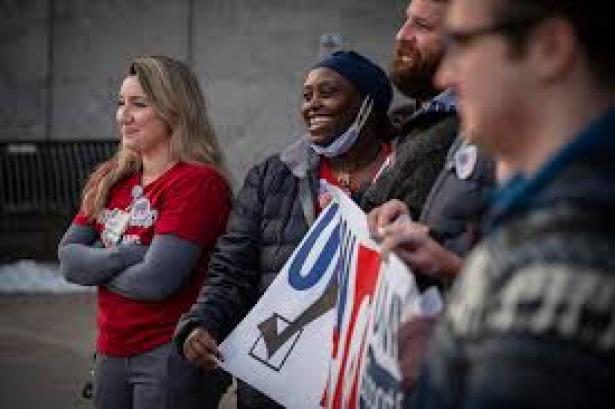Unlike some local and national unions, the AFL-CIO’s state and local bodies rarely hold contested leadership elections with opposing slates offering alternative strategies for reviving the labor movement. Yet in Vermont, there have been two such contests for the state federation in the last four years, both producing a mandate for change.
In 2019, a group of local union officers and staff members created a reform slate called “Vermont AFL-CIO United!” Fourteen of its candidates got elected — taking all the top officer jobs and forming a majority on the state labor council’s executive board. Their goal was to revitalize a moribund organization through membership education, mobilization, and direct action, plus greater independence from the Democratic Party.
A key organizer of the United! slate four years ago, American Federation of State, County and Municipal Employees (AFSCME) activist David Van Deusen, stepped down as Vermont AFL-CIO president after two terms in September. (He recounts his stormy tenure in a forthcoming book entitled Insurgent Labor.) After another highly competitive election campaign, state labor council delegates chose Katie Maurice, a thirty-one-year-old fellow member of AFSCME and the Democratic Socialists of America (DSA) as his successor.
The United! slate again won a majority of the seats on the state federation’s executive board. Maurice’s running-mate, Ellen Kaye, from the American Federation of Teachers, became executive vice president. And Danielle Bombardier, a working member of the International Brotherhood of Electrical Workers, rounded out their all-female leadership team as secretary treasurer.
At the convention, Vermont labor activists also celebrated an affiliation agreement with the long-independent State Employees Association, which have doubled the number of workers represented by the AFL-CIO in Vermont.
In this interview, conducted by Steve Early, Maurice discusses her own path to joining a union, becoming a DSA member, and, now reportedly, the youngest state labor federation president in the country.
What led to your involvement in the labor movement?
After working on the administrative side of a private business for a few years, I was sick and tired of watching wages steadily rise for the men who were buddies with the boss while the women picked up all the slack for a fraction of their pay. I witnessed wage theft in the form of regular punch card adjustments by management and overt sexism and racism directed at the lowest-paid workers, who had no real in-house recourse for these abuses.
I didn’t want my sense of dignity checked at the door when I entered my workplace. So, when given the chance, I jumped at the opportunity to get the hell out of there. I wanted a job where I had a voice and power over my own working life and labor — where democracy extended into the workplace and everyone was treated like the human beings we are.
What changed when you became an AFSCME member?
I joined AFSCME in early 2020, when I became a behavioral interventionist at the Howard Center, in Burlington, Vermont, our state’s largest social service agency, which has a staff of sixteen hundred. After COVID-19 hit, my coworkers and I were briefly furloughed. We got help from our union filing for unemployment benefits. When we were recalled to our jobs, navigating life as an “essential worker” providing face-to-face mental health services during a pandemic posed all kinds of safety risks.
So that summer, I became a union steward and helped secure stricter safety measures to protect staff working at a summer camp. By the next winter, I was elected to serve as vice president of our Local 1674, and the following year I became president.
What kind of social service work have you done at the Howard Center?
I’ve spent most of my time providing one-on-one behavioral support in public schools serving kids who have emotional, behavioral, developmental, and intellectual disabilities, from disproportionately poor and working-class families. Many of my fellow AFSCME members work directly with children and adults with a variety of disabilities in the community, in schools, residential facilities, and some workplaces. We also staff crisis programs, including those for substance use and recovery.
Every day, we are on the front lines of disaster capitalism, a Band-Aid that is sorely needed but never enough. While very essential, our work doesn’t address any root problems — like criminalization of poverty and homelessness or diseases like addiction that are often rooted in socioeconomic stressors. The lower-income Vermonters we serve lack universal healthcare, affordable housing and public transportation, access to education and secure employment, and leisure time and recreational spaces, not to mention opportunities to enjoy art and culture.
Why did you join DSA?
I signed up in November of 2021 and remain a rank-and-file member of Champlain Valley DSA. I joined DSA because the root cause of so many of our problems, as a working class, is capitalism itself, which robs working people of the resources needed to survive and live freely. I think we need to build a different economy, that puts people over profits. In the meantime, we need to create a broad-based anti-capitalist, anti-fascist labor movement in Vermont.
What made you decide to get involved in a state level affiliate of the national AFL-CIO, which is not the typical venue for labor activism by a young labor radical?
What motivated me was seeing the lack of essential resources provided to struggling unions in our rural and, thus, often ignored state. Anyone fortunate enough to be part of a progressive service sector local can’t confine themselves to that space alone. We need to engage with the wider labor movement, which is still at its lowest point in terms of union density and strike activity, despite resurgent younger worker interest in on-the-job organizing. If we fail to do so, members of too many unions will continue to be sold out and crushed and even the remaining left and progressive enclaves will collapse.
Could you tell us about the reform faction that has won two contested elections for the leadership of the Vermont labor council?


Spread the word